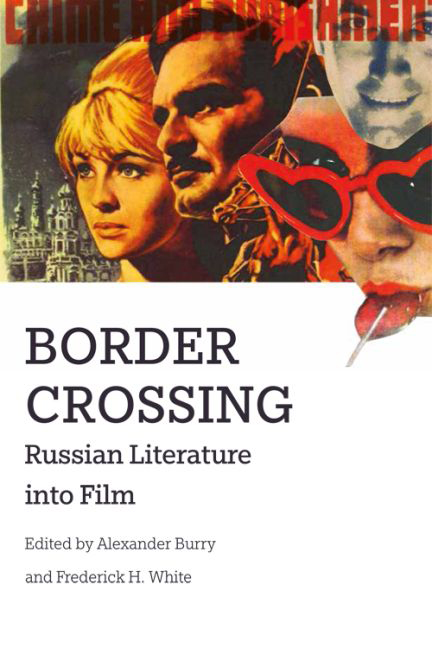Book contents
- Frontmatter
- Contents
- List of Figures
- Notes on the Contributors
- Introduction: Filming Russian Classics—Challenges and Opportunities
- 1 Across the Russian Border
- 2 Dostoevskii's “White Nights”: The Dreamer Goes Abroad
- 3 On Not Showing Dostoevskii's Work: Robert Bresson's Pickpocket
- 4 Stealing the Scene: Crime as Confession in Robert Bresson's Pickpocket
- 5 The Eye-deology of Trauma: Killing Anna Karenina Softly
- 6 “A Vicious Circle”: Karen Shakhnazarov's Ward no. 6
- 7 A Slap in the Face of American Taste: Transporting He Who Gets Slapped to American Audiences
- 8 Against Adaptation? The Strange Case of (Pod) Poruchik Kizhe
- 9 Chasing the Wealth: The Americanization of Il'f and Petrov's The Twelve Chairs
- 10 Fassbinder's Nabokov—From Text to Action: Repressed Homosexuality, Provocative Jewishness, and Anti-German Sentiment
- 11 “The Soviet Abroad (That We Lost)”: The Fate of Vasilii Aksenov's Cult Novel A Starry Ticket on Paper and on Screen
- Conclusion: Passport Control—Departing on a Cinematic Journey
- Bibliography
- Filmography
- Index
4 - Stealing the Scene: Crime as Confession in Robert Bresson's Pickpocket
- Frontmatter
- Contents
- List of Figures
- Notes on the Contributors
- Introduction: Filming Russian Classics—Challenges and Opportunities
- 1 Across the Russian Border
- 2 Dostoevskii's “White Nights”: The Dreamer Goes Abroad
- 3 On Not Showing Dostoevskii's Work: Robert Bresson's Pickpocket
- 4 Stealing the Scene: Crime as Confession in Robert Bresson's Pickpocket
- 5 The Eye-deology of Trauma: Killing Anna Karenina Softly
- 6 “A Vicious Circle”: Karen Shakhnazarov's Ward no. 6
- 7 A Slap in the Face of American Taste: Transporting He Who Gets Slapped to American Audiences
- 8 Against Adaptation? The Strange Case of (Pod) Poruchik Kizhe
- 9 Chasing the Wealth: The Americanization of Il'f and Petrov's The Twelve Chairs
- 10 Fassbinder's Nabokov—From Text to Action: Repressed Homosexuality, Provocative Jewishness, and Anti-German Sentiment
- 11 “The Soviet Abroad (That We Lost)”: The Fate of Vasilii Aksenov's Cult Novel A Starry Ticket on Paper and on Screen
- Conclusion: Passport Control—Departing on a Cinematic Journey
- Bibliography
- Filmography
- Index
Summary
Robert Bresson's 1959 film Pickpocket, ostensibly based on Crime and Punishment, begins with the declaration, “This is not a detective story.” And it is not. The titular thief, Michel (Martin LaSalle), confesses in the opening scene, so that viewers learn “whodunnit” before ever witnessing a crime. The only mystery left is motive: What drives Michel to steal, and to pick pockets, in particular? And how does it become so compulsive that he will drop everything, even romance, when a stranger with a handsome watch walks by? Studies of Bresson and Pickpocket are full of references to the inscrutability of the protagonist. T. Jefferson Kline quotes Bresson's cameraman, Léonce- Henry Burel, as saying, “I didn't understand what [Bresson] was trying to say. As I matter of fact I don't think anybody has ever understood, really. Who is this pickpocket, why does he steal, and so on?” Keith Reader notes that it is hard to read the film as “a confessional autobiography,” as the frame narration would suggest, due to the “extraordinary lack of psychological detail.” Susan Sontag thinks Michel's “psychological implausibility” is a “flaw” of the film, elaborating that she believes Bresson “does not intend his characters to be implausible, I'm sure; but he does, I think, intend them to be opaque.” As these evaluations suggest, Michel's own discussion of his behavior is far from coherent or insightful. In fact, his narration adds nothing to our understanding of the events unfolding on screen. Pickpocket is not a detective story, because the plot is not driven by the investigation of the crime, but by Michel's attempts to confess. What baffles us is not how Michel picks pockets—the technique is shown in minute detail—but why he cannot explain the impetus behind his acts.
Pickpocket belongs to the subset of confessional narratives reserved for criminals whose motives elude them, works like Fedor Dostoevskii's Crime and Punishment and Albert Camus's The Stranger, which serve as important intertexts for Bresson's film. This chapter explores the relationship of Pickpocket with these earlier texts and elucidates Bresson's engagement with the problems of confession, particularly of confession in the context of modernism, with its rejection of determinism and accompanying breakdown in causality.
- Type
- Chapter
- Information
- Border CrossingRussian Literature into Film, pp. 85 - 101Publisher: Edinburgh University PressPrint publication year: 2016

